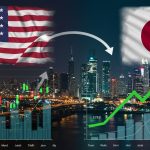The financial world is watching closely as US Treasury yields surge to unprecedented levels, causing ripples across global bond markets. This dramatic shift, with the 30-year Treasury yield briefly exceeding 5% in Asia, represents the most significant jump since the pandemic began in 2020. The pressure from US Treasury yields has spread internationally, affecting government bonds in Australia, the UK, and developing nations.
US Treasury Yields Reach Alarming Levels
The abrupt rise in US Treasury yields has created concerns among investors worldwide. While the selloff slowed during US trading hours as stocks recovered and a 10-year note auction by the US Treasury alleviated some immediate worries, yields remained elevated. The 30-year bond yield settled at approximately 4.85% (up 8 basis points), while the 10-year yield reached 4.4% (up 10 basis points).
This surge in US Treasury yields establishes higher baseline rates across the financial system, affecting everything from mortgage rates to business loans. The timing couldn’t be worse as the global economy already faces potential recession risks due to President Trump’s aggressive trade policies.
Impact of Rising US Treasury Yields on the Economy
“This is creating a triple whammy for the economy – a trade war, uncertainty and now higher rates,” warned Priya Misra, portfolio manager at J.P. Morgan Investment Management.
The dramatic increase in US Treasury yields directly contradicts Treasury Secretary Scott Bessent’s stated economic goals of reducing consumer borrowing costs. Despite this contradiction, Bessent downplayed concerns in a recent television interview, describing the situation as “uncomfortable but normal deleveraging that’s going on in the bond market,” and suggesting the trend would be temporary.
International Investors and US Treasury Yields
Market observers worry that foreign investors, crucial to financing the US government’s budget deficit, might respond to rising US Treasury yields by selling bonds. This scenario raises the specter of a “buyers strike” similar to what rapidly ended former UK Prime Minister Liz Truss’s tenure when her fiscal plans alarmed investors.
However, the results of the recent 10-year Treasury auction provided some relief. “There was a collective sigh of relief,” noted Jack McIntyre, portfolio manager at Brandywine Global Investment Management.
Global Market Reactions to US Treasury Yields
The bond market decline left investors without traditional safe havens as European and Asian stocks tumbled, with Europe’s Stoxx 600 falling about 3%. US stocks, however, rebounded on speculation that Trump might moderate his tariff proposals.
The unusual spike in US Treasury yields has puzzled traders, who offer various explanations including concerns about worsening government budget deficits if the economy contracts or if the administration implements fiscal measures to offset economic impacts.
Potential Hidden Risks in Bond Markets
Some analysts point to deeper concerns and possible hidden risks affecting US Treasury yields. Speculation includes the possibility that hedge funds were forced to quickly unwind basis trades that use leverage to bet on small market discrepancies, similar to the selloffs of 2020.
George Saravelos, global head of FX strategy at Deutsche Bank AG, cautioned that “we are entering uncharted territory in the global financial system” and suggested that continued disruption in the US Treasury market might require Federal Reserve intervention through emergency purchases to stabilize the bond market.
International Relations and US Treasury Markets
Some investors speculate that global reserve managers, particularly China, might be reconsidering their positions in US government debt given the significant impact of Trump’s trade policies. Official data indicates that both China and Japan had already been reducing their Treasury holdings over time.
Julian Brigden, co-founder of Macro Intelligence 2 Partners, raised the question directly: “Is this sovereign selling? That’s the one everyone keeps asking. This is an economic war. It’s absolutely the sell the US trade.”
As global markets continue to react to these developments, investors worldwide will be closely monitoring US Treasury yields for signs of stabilization or further volatility.



